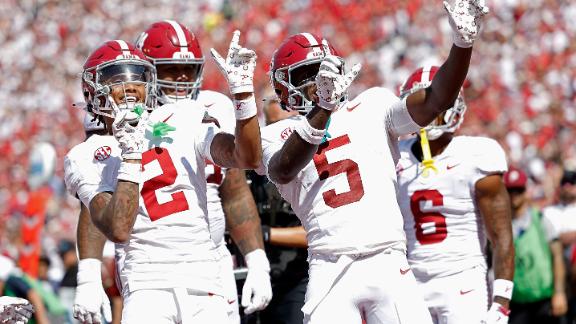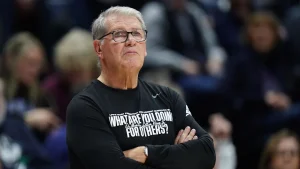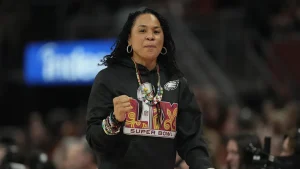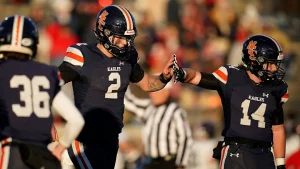
Jalen Hurts’ decision following Super Bowl LIX has Alabama under fire.
Jalen Hurts’ path from Alabama to becoming a Super Bowl MVP with the Philadelphia Eagles has sparked widespread attention and generated significant discourse, especially regarding the decisions made during his time at the University of Alabama. Hurts’ story is more than just that of a talented football player; it represents themes of resilience, determination, and the intricacies of college football dynamics. His trajectory has now become a point of reflection for both Alabama and the broader college football community, especially after his standout performance in Super Bowl LIX.
A Glimpse into Jalen Hurts’ Super Bowl LIX Journey
The Eagles’ victory over the Kansas City Chiefs in Super Bowl LIX showcased Hurts at his best, demonstrating the remarkable growth and maturity that had often been questioned during his time in college. Hurts’ performance included two touchdown passes and a rushing touchdown, as well as 72 rushing yards. His effort was a defining one for the Eagles, whose dominant 40-22 win secured their second Super Bowl victory. For Hurts, this victory wasn’t just about securing an NFL title; it also signified a form of redemption, as he had already faced his fair share of criticism over the years, from both analysts and fans.
In a way, Hurts’ ability to overcome adversity, to rise above those who doubted his potential, mirrored his collegiate experience. His ascension to Super Bowl MVP status represents not just his personal excellence, but also how he has evolved as a quarterback since the days when Alabama made decisions that ultimately led to his transfer.
The Alabama Chapter: A Glimmer of Greatness Amid Uncertainty
Hurts first arrived at Alabama as a highly touted recruit with tremendous expectations placed on him. The Crimson Tide were a powerhouse, and Hurts had a chance to continue the program’s legacy as one of the country’s elite football teams. Early on, Hurts exceeded expectations, earning the starting quarterback role as a freshman. By his sophomore year, he had already led the team to a National Championship appearance. However, it was during the 2018 National Championship Game that his career would take an unexpected turn.
Hurts was benched in favor of the then-freshman quarterback Tua Tagovailoa, a move that would have far-reaching implications. Despite Hurts’ stellar performance throughout the season, Alabama head coach Nick Saban made the decision to insert Tagovailoa at halftime after Hurts struggled to move the offense. Tagovailoa led the Tide to a comeback win, which cemented his place as the starting quarterback moving forward.
While Alabama’s decision paid off in that particular game, the benching of Hurts sparked fierce debate and left questions about the handling of his future. Many saw Hurts’ benching as a sign of disrespect, particularly because Hurts had been one of the most successful quarterbacks in Alabama’s history at that point, leading them to multiple conference titles and a National Championship game. The decision made by Saban, while ultimately successful, cast a shadow over Hurts’ standing at Alabama and set in motion the chain of events that would lead to Hurts’ departure from the program.
The Transfer: A New Beginning at Oklahoma
After the 2018 season, Hurts made the difficult decision to leave Alabama and transfer to the University of Oklahoma, where he was welcomed with open arms by head coach Lincoln Riley. In his one year at Oklahoma, Hurts thrived, showcasing his elite talent in an offensive system that was a perfect fit for his skills. He threw for over 3,800 yards and 32 touchdowns, while also rushing for over 1,200 yards and another 20 touchdowns. He finished as a Heisman Trophy finalist, further proving that he had the ability to shine as a quarterback at the highest levels of college football.
His success at Oklahoma served as a reminder of the potential that Alabama had perhaps failed to fully tap into. Hurts demonstrated that he was not just a dual-threat quarterback but a polished, complete player who had developed into a capable NFL prospect. It also showcased the importance of player development and the need for coaches to understand the nuances of a player’s growth.
Alabama Under Fire: The Criticism Grows
In the wake of Hurts’ Super Bowl LIX success, Alabama has faced criticism for the way it handled his time with the program. Many feel that Hurts, who had demonstrated immense potential, was not given the opportunity to continue developing as a starter after his sophomore year. His subsequent success at Oklahoma, capped by his MVP-worthy performance in the Super Bowl, has intensified calls for Alabama to reevaluate how it manages player development, particularly in a quarterback room with multiple highly talented individuals.
The criticism of Alabama’s handling of Hurts is not just about the benching in the 2018 National Championship Game but also about the broader approach to player development. The narrative has been that Hurts was never fully given the tools or trust to be the face of Alabama’s offense, which ultimately pushed him to explore options outside of the program. Critics argue that Hurts’ departure could have been avoided if he had been supported and nurtured more effectively during his time in Tuscaloosa. Instead, the program’s reliance on immediate performance and winning championships over long-term development led to a key player leaving.
This criticism has raised difficult questions about Alabama’s approach to coaching, particularly in light of the program’s history of success. While Saban’s system is known for producing winners and championship-caliber teams, it also has its limitations, particularly in terms of player development beyond the immediate impact on the field.
The Importance of Long-Term Player Development
Jalen Hurts’ journey from Alabama to Oklahoma and ultimately to the NFL is a case study in player development. It underscores how crucial it is for programs to recognize the growth potential in their athletes. Hurts may not have been the ideal fit for Alabama’s offensive system, but his perseverance, work ethic, and adaptability allowed him to succeed in a different environment.
Hurts’ success also serves as a reminder that athletes must be given the space to grow and evolve. His rise to the Super Bowl, after overcoming adversity and transferring to Oklahoma, shows that talent is not always realized in the first program or system to which an athlete is assigned. This has larger implications for college football, as more and more players are choosing to transfer in search of better opportunities and more fitting systems. The rise of the transfer portal is a reflection of a changing landscape in college football, one in which athletes have more agency over their futures than ever before.
Alabama, and college football in general, must adapt to these changes. The next generation of players will be looking not only for strong coaching and championship potential but also for an environment that nurtures their individual growth and long-term success.
Looking Forward: Hurts’ Legacy
As Hurts continues his NFL career, his legacy as a player who overcame challenges and excelled against the odds is beginning to take shape. His success in Super Bowl LIX will be remembered as a defining moment not just for the Philadelphia Eagles but for college football as well, particularly for the players who may have been in a similar situation to Hurts during his time at Alabama.
Alabama, as a program, has certainly faced its share of criticism over the years, but it remains one of the most prestigious and successful programs in college football. However, the scrutiny over Hurts’ experience has raised valid questions about its future in terms of player development. Alabama must consider how it manages its roster and the athletes it recruits, ensuring that players are not only put in positions to succeed on the field immediately but also given the room to grow and evolve into the best versions of themselves, both as players and individuals.
Ultimately, Jalen Hurts’ success is a victory for his perseverance and commitment, but it’s also a cautionary tale for college football programs that may place too much focus on immediate results rather than long-term development. Alabama’s role in Hurts’ story may remain under scrutiny, but his rise to prominence is a testament to the player he became, regardless of the obstacles he faced along the way.





